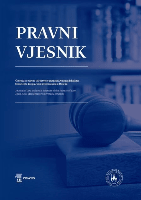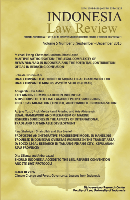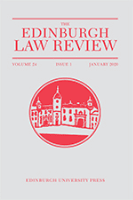
SYDNEY LAW REVIEW
Scope & Guideline
Navigating the Evolving Landscape of Law
Introduction
Aims and Scopes
- Constitutional Law and Governance:
The journal explores the intricacies of the Australian Constitution, including principles of governance, legality, and judicial interpretations that shape the legal landscape. - Comparative Legal Studies:
It fosters comparative analyses between Australian law and international legal frameworks, particularly in areas such as human rights, environmental law, and corporate governance. - Socio-Legal Studies:
The integration of socio-legal perspectives allows for an examination of how law interacts with social issues, including family law, immigration, and public health. - Emerging Legal Technologies:
The journal addresses the implications of technological advancements on legal practices, including artificial intelligence, privacy, and intellectual property. - Legal Reforms and Policy Analysis:
A focus on critical evaluations of legal reforms and their impacts on society, particularly in areas such as criminal law, consumer protection, and employment law.
Trending and Emerging
- Climate Change Law:
Recent publications indicate a growing emphasis on legal responses to climate change, including legislative frameworks and judicial interpretations, underscoring the urgency of environmental issues. - Consumer Protection and Corporate Responsibility:
There is a notable trend towards examining consumer rights, particularly in relation to corporate practices and emerging technologies, reflecting increasing public concern over corporate accountability. - Digital Law and Technology Regulation:
The rise of digital technologies has led to a surge in discussions around the regulation of artificial intelligence, privacy, and data protection, highlighting the need for adaptive legal frameworks. - Social Justice and Human Rights:
Emerging themes reflect a heightened focus on social justice issues, including discussions on systemic inequalities, immigration law, and the rights of marginalized communities. - Public Health Law:
The COVID-19 pandemic has catalyzed a significant increase in legal analysis related to public health, including the legality of government restrictions and their implications for civil liberties.
Declining or Waning
- Traditional Contract Law:
There has been a noticeable decrease in papers focusing on conventional contract law doctrines, possibly overshadowed by more contemporary issues such as digital contracts and consumer rights. - Historical Legal Analysis:
Explorations of historical legal cases and their implications for modern law have become less frequent, indicating a shift towards more immediate and pragmatic legal discussions. - Criminal Law Case Studies:
While criminal law remains a significant area, specific case studies regarding traditional criminal offenses are less prevalent, as the focus has shifted to broader systemic issues such as crimmigration. - Legal Philosophy:
Discussions centered on abstract legal philosophy appear to be waning, as the journal increasingly prioritizes empirical research and practical legal implications. - Environmental Law Precedents:
Although environmental law is still a topic of interest, the focus on historical precedents is declining in favor of current legislative responses and frameworks.
Similar Journals

Pravni Vjesnik
Fostering Discourse in Law and Society.Pravni Vjesnik is a peer-reviewed academic journal published by the Pravni Fakultet Sveučilišta Josipa Jurja Strossmayera & Osijek, primarily focusing on the field of law within the social sciences. Since transitioning to an Open Access model in 2016, the journal has broadened its accessibility, allowing researchers, professionals, and students to engage with diverse legal scholarship without subscription barriers. With an ISSN of 0352-5317 and an E-ISSN of 1849-0840, Pravni Vjesnik plays a crucial role in disseminating knowledge and fostering discourse in the legal community, particularly within the context of the Croatian legal system and broader European legal frameworks. Although it holds a rank of #760 out of 1025 in the Scopus database, placing it in the 25th percentile of law journals, its commitment to quality and relevance ensures its importance as a resource for rigorous academic inquiry. The journal's scope is anticipated to expand from 2019 to 2024, promoting ongoing research in contemporary legal issues. This dedication to publishing comprehensive and impactful studies makes Pravni Vjesnik an essential platform for those involved in the legal field.

Indonesia Law Review
Exploring the Complexities of Indonesian LawIndonesia Law Review is a premier open-access academic journal dedicated to advancing knowledge in the fields of law and social sciences, with particular emphasis on the Indonesian legal landscape. Established by the Indonesian Law Review, this journal has made significant strides since becoming open access in 2014, ensuring that research is freely available to a global audience. Based in Depok, West Java, the journal seeks to foster scholarly discourse on legal issues pertinent to Indonesia, while also contributing to the broader field of education and social sciences. With its current Scopus rankings placing it within the top tiers of law and social sciences, including a Q3 categorization in law and a Q4 classification in education and miscellaneous social sciences, the **Indonesia Law Review** serves as a vital platform for researchers, professionals, and students to disseminate their findings and engage with contemporary legal dilemmas. The journal is committed to providing a robust forum for innovative legal scholarship and is an essential resource for anyone seeking to understand the complexities of law in Indonesia and beyond.

COLUMBIA JOURNAL OF LAW AND SOCIAL PROBLEMS
Bridging Legal Theory and Social JusticeCOLUMBIA JOURNAL OF LAW AND SOCIAL PROBLEMS is a distinguished academic journal published by the COLUMBIA JOURNAL TRANSNATIONAL LAW ASSOCIATION, dedicated to the intersection of law and social issues. Established in 1973, this journal serves as a platform for the exploration and analysis of socio-legal problems in the contemporary context. With its robust scope encompassing areas such as social justice, legal reform, and public policy, the journal appeals to researchers, professionals, and students alike who are engaged in critical examinations of the legal systems and their societal impacts. Although it is not an open-access journal, it maintains academic rigor as reflected in its Q4 ranking across various categories including Law and Sociology, indicating its commitment to disseminating scholarly work that contributes to ongoing discussions in these fields. The journal’s address at Columbia University School of Law in New York situates it within one of the leading centers for legal scholarship, making it an essential resource for those seeking to deepen their understanding of law's role in addressing social problems.

FORDHAM LAW REVIEW
Fostering Innovation in Legal Theory and PracticeFORDHAM LAW REVIEW is a prestigious legal journal published by Fordham University, School of Law, based in the United States. Established to disseminate cutting-edge legal scholarship, this journal has consistently achieved an impactful standing within the field, evidenced by its category ranking as Q1 in Law for 2023 and its Scopus ranking of #428 out of 1025 in the Social Sciences Law category, placing it in the 58th percentile. The journal welcomes submissions across diverse legal topics, fostering discourse that advances both legal theory and practice. Although it does not currently offer open access options, the Fordham Law Review serves as a vital resource for scholars, practitioners, and students seeking insights into contemporary legal challenges and developments. With its rich publication history dating back to the converged years of 1973 through 2024, the journal continues to be a cornerstone for rigorous legal analysis and a platform for influencing the evolution of law.

TEXAS LAW REVIEW
Your Gateway to Pivotal Legal InsightsTEXAS LAW REVIEW, an esteemed legal journal published by TEXAS LAW REVIEW PUBL INC, stands as a pivotal resource in the field of law, contributing significantly to legal scholarship since its inception. With an ISSN of 0040-4411 and an E-ISSN of 1942-857X, this journal is recognized for its rigorous analysis of pressing legal issues and case law, making it essential reading for legal practitioners, scholars, and students alike. Positioned in the Q2 category for Law (2023), and ranked 343 out of 1025 in the Scopus database, TEXAS LAW REVIEW holds a commendable 66th percentile, highlighting its influence among legal publications. While it does not offer open access, the journal ensures that its high-quality articles are accessible to a wide range of legal audiences. Based in Austin, Texas, the journal's continuous evolution since 1977 reflects its commitment to adapting legal discourse to contemporary challenges, thereby cementing its status as a vital platform for those dedicated to understanding and shaping the legal landscape.

AUSTRALIAN LAW JOURNAL
Empowering Legal Discourse with Rigorous ResearchThe Australian Law Journal, published by Lawbook Co Ltd, has long been a cornerstone in the legal scholarly community, serving as a vital resource for legal practitioners, scholars, and students since its inception. With an ISSN of 0004-9611, this esteemed journal provides a platform for a diverse array of legal discourse, ranging from analyses of contemporary law to examination of historic legal principles. Though traditionally not open access, the journal continues to uphold a commitment to excellence through a rigorous peer-review process, thus ensuring high-quality research dissemination. The journal's extensive archives reflect its long-standing relevance, covering various periods including 1974 onward, with significant contributions made between 1976 to 1978, 1986 to 1988, and 1993, among others. Engaging with this publication is essential for those seeking to advance their understanding of Australian law and its application, making it an invaluable resource for anyone involved in legal studies or practice.

Edinburgh Law Review
Fostering critical dialogue in law and cultural studies since 1997.Edinburgh Law Review is a distinguished journal published by Edinburgh University Press, dedicated to advancing discourse in the realm of law, cultural studies, and history. With its ISSN 1364-9809 and E-ISSN 1755-1692, this journal has been contributing valuable scholarly content since its inception in 1997, and it continues to be a vital resource for researchers, legal practitioners, and students alike. Although it currently does not provide Open Access options, the journal's rigorous peer-review process ensures that each article meets the highest academic standards. Known for its diverse range of topics, the Edinburgh Law Review holds a Q4 ranking within its categories in Cultural Studies, History, and Law in 2023, reflecting a commitment to engaging with contemporary issues in these fields. With a noticeable presence in Scopus rankings, this journal is essential for those seeking to deepen their understanding of the intersections of law, culture, and history within a British context.

Revista Juridica de Castilla y Leon
Catalyzing Change in the Legal Landscape of SpainRevista Juridica de Castilla y Leon is a prestigious academic journal dedicated to advancing legal scholarship in the field of law and governance. Published by the JUNTA CASTILLA & LEON, CONSEJERIA PRESIDENCIA & ADM TERRITORIAL, this journal plays a vital role in disseminating high-quality research and foster dialogue among legal practitioners, researchers, and students alike. Since transitioning to Open Access in 2003, it has removed barriers to knowledge, allowing a global audience uncontrolled access to innovative legal studies and practices. With its ISSN 1696-6759 and E-ISSN 2254-3805, the journal is committed to publishing articles that address contemporary issues and challenges in the legal landscape, particularly those relevant to the Spanish context. As a reliable source for its readers, Revista Juridica de Castilla y Leon contributes significantly to the field of law, encouraging interdisciplinary research and collaboration to influence policy and improve legal frameworks in Spain and beyond.

INDIANA LAW JOURNAL
Championing Innovative Legal ScholarshipINDIANA LAW JOURNAL, a premier publication in the field of law, serves as a vital platform for scholarly discourse and legal scholarship. Established in 1973 and originating from the Indiana University School of Law in Bloomington, this esteemed journal publishes a diverse range of articles, essays, and commentary from both established and emerging legal scholars. With an impressive Scopus Rank of #350 out of 1025 in the Social Sciences domain, placing it in the 65th percentile, the journal is recognized for its contributions to the legal academic community. Its 2023 category quartile ranking of Q2 underscores its significance and relevance, ensuring that published works are widely acknowledged and cited. Although not an open access journal, the INDIANA LAW JOURNAL is committed to fostering robust academic exchanges and enhancing understanding in various legal fields, making it an indispensable resource for researchers, professionals, and students alike. With a history of convergence in publication timelines, it continues to evolve in response to the continually changing legal landscape.

Vestnik Permskogo Universiteta-Juridicheskie Nauki
Empowering Researchers with Open Access Legal StudiesVestnik Permskogo Universiteta-Juridicheskie Nauki, published by the Perm State National Research University, serves as a prominent platform for the dissemination of legal scholarship since its inception. With an Open Access policy implemented in 2009, this journal offers a wide range of legal studies, including comparative law, constitutional law, and international law, making it an essential resource for researchers, academics, and practitioners in the field. Although it is a relatively young publication, its commitment to quality and accessibility has established it as a respected voice in jurisprudence, contributing significantly to both national and international legal discourse. Researchers and students alike will find valuable insights within its pages, encompassing the latest developments and theoretical advancements within Russian and global legal systems. For those looking to stay informed on current legal issues and academic debates, this journal is a must-read.